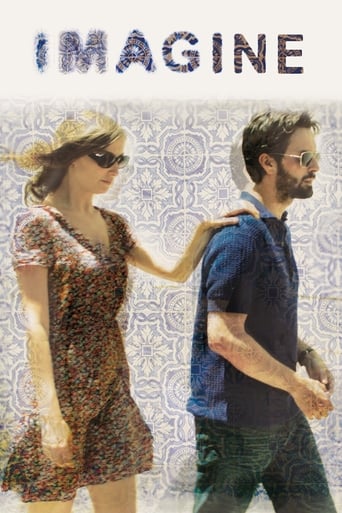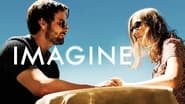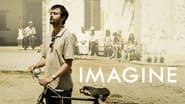Howard Schumann
French Novelist Marcel Proust said, "The real voyage of discovery lies in not seeing new landscapes but in having new eyes." Polish Director Andrzej Jakimowski's Imagine, a film about the world of the visually impaired, takes us beyond sight to look at the world through different eyes, that of the totality of our senses. Winner of the 2014 Audience Award and Best Director at the Warsaw Film Festival, Imagine is set in Lisbon, Portugal at an institute for the blind where children are taught to live with their disability, to not take risks, and to be comfortable at all times. When Ian (Edward Hogg) a non-conformist teacher who is also visually impaired is hired at the school, however, the safety of their world is shaken.Rejecting the use of a cane, Ian teaches the children to achieve spatial orientation by using all of their senses including moving by the resonance of sound vibrations (echolocation), instinct, and the creative use of their imagination. Confident and even slightly over-aggressive, Ian charms the children and gives them a reason to hope, though they are always testing and questioning him to prove that he is one of them and never seem quite convinced of his sincerity. Ian's sessions take place right under the window of Eva (Alexandra Maria Lara), an adult patient who never leaves her room and does not speak to anybody. Surprisingly, she becomes one of his most responsive students and there is even a hint of romance.Taking the students out into the streets of Lisbon, we see the city in all its light and beauty, but the blind can see none of it. Ian clicks his tongue and snaps his fingers when he walks, using the sound that bounces off objects to create his own space, teaching the students how to visualize with their ears. As Eva wears a pair of high heel shoes for the first time, the two bond as they begin to trust each other. Together they visit a café (where she flirts with a young man), walk along the harbor and cross busy streets without any aids other than their ability to listen for the sounds of vehicles, footsteps, or other obstacles in their path.With them is Serrano (Melchior Derouet), a young blind boy whom Ian asks to use his imagination to "see" a ship in the harbor. Jakimowski resists the temptation to idealize Ian or portray the disabled as saints. Neither does he take sides when the new teacher is challenged by the school doctor and head teacher of the school (Francis Frappat) who is concerned that he is giving the children the illusion of hope. Convinced of the value of his approach, however, Ian walks a thin line between taking risks and being reckless and crosses the line once too often.Supported by the authentic performances of Hogg and Lara, Jakimowski, as in his great 2007 film Tricks, creates an atmosphere of poetry and magic that challenges viewers to use all of their sense perception to create the world. According to Jakimowski, "We the sighted perceive the world very similarly to the blind. We also don't see what's important…We're all blind. In a sense we are blinder than they are. Even more, because in their own way they compensate with other senses." In this case, it's the blind leading the blind so that we all can see.
Horst in Translation ([email protected])
"Imagine" took a while to make it here. The film already premiered in 2012 in the director's country and by now it has already reached the rest of the world. It's Andrzej Jakimowski's third movie, ten years after his first and five years after his second. We follow the paths of a blind man and woman. On a side-note is there anything worse than not being able to see the gorgeous Alexandra Maria Lara!? The most memorable thing about the movie, to me, (besides the occasionally stunning cinematography and landscapes) were the sound effects, which stood out a lot and made it easy even for people in the audience who are able to see to take a dive into the life of blind people. Our acoustic sense is emphasized a lot here and we can feel the different noises almost as vividly as the two main characters. The other besides Lara (probably the one being even more in the center) is played by Edward Hogg: Ian is a blind man teaching the blind with unorthodox methods that always seem to walk the fine line between greatness and danger, sometimes even cross it. Early on he says something like that his old boss really was in favor of his methods, but the new one did not approve at all. It's a nice summary. There's not really the option of indifference when it comes to his teaching style. It's either love or hate in a similar sense of Hugh Laurie's House M.D. His colleagues who are able to see tend to struggle occasionally as well with his mannerisms. Why is he not using a cane? He is blind, so he has to right? One of my favorite scenes even if it was s sad one was where he downright begs for his job and you can easily see that it's more for him than just a profession: it's his dedication. Alexandra Maria Lara gives a decent performance, which serves more as a love interest to the main character than as a showy character with extraordinary depth herself, but that's perfectly fine. I'm a bit uncertain about Melchior Derouet's Serrano though. To me he didn't do much and I have doubts about whether I just did not like the character (which would not be too bad) or did not like the way the actor played the character. In any case I probably could have done without his storyline. To me, he just felt rushed in so that there is a character who's different than all the other students and who is not too impressed by his teacher unlike all the others. It felt a bit just for the sake of it. The scene near the end with the giant ship was one of the weakest of the film in my opinion and this is where it gets a bit lost.About the end, there is as in so many cases no black and white, but something in between and everybody needs to decide for himself if it's a happy ending or not. A final approval goes to the children who played the blind characters. And did a very credible job doing so. I'm not sure if they were blind themselves or not, but in any case you could make a point for them delivering credible and convincing performances which probably weren't easy to come up with at all. Well done to the child actors.
Bruno Saramago de Almeida
Avoid like the plague.Just wanted to write a quick warning, so that you won't be deceived by the hype here, so far. On its favour, I can state the sensibility displayed and the noble cause. And, being a Lisboner myself, it is obviously a very beautiful, soulful and picturesque place to film. Nevertheless, the cinematographer Adam Bajerski did a very interesting job.OK, that's mostly it. The acting is terrifyingly dull. Starting right with the main actor - I mean, this guy couldn't act if his life depended on it. Cringeworthy. Alexandra Lara, while far from a top-class performer, shows more than enough chops when rightly directed (vide the superb Control). Not the case here. Of course the campy, rather pedestrian dialogue never helps. And its delivery feels ever so awkward, not for once natural or credible. People just don't talk like that. I don't even want to dwell much on the script problems, but why the hell would English, french (and even a German ex-pat) blind children be doing on such a far from luxurious institution in Lisbon? Certainly all the sun and light are not the best treatment for the blind-eye - probably explaining the high blindness rates. You'll very often find yourself bumping into a blind person, whilst walking the streets of Lisbon.To sum things up, in the hands of the right director this could have definitely been something. Keeping the moody slow rhythm and attention to sounds, but being more demanding with the extras and supporting actors. Even Ian's darker side should have been more wisely explored. Instead you are left with a slow movie, going nowhere, with a somewhat ridiculous script and with weakly handled tension scenes. You'd be better off driving that same 28 tram at the end of the movie and visiting a city far more interesting that its all-too-scenic display.
Rox73
I don't know anyone who is blind and I have never interacted with blind people. Edward Hogg was a very convincing blind person (as far as my limited knowledge of blindness goes). Great actor with a lot of charisma. "They look but they don't see" - yes, that should be written on the foreheads of most of us who aren't blind. I think I will appreciate the sounds and scents of life a little bit more from now on after seeing this excellent film - a subject not many have covered in show business. What I would want to know though, is it possible for a blind person to fine tune their other senses so much that they don't need a cane or a dog?



